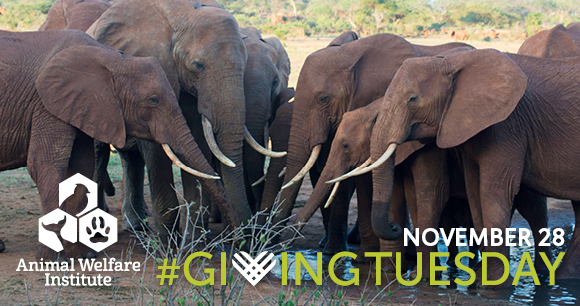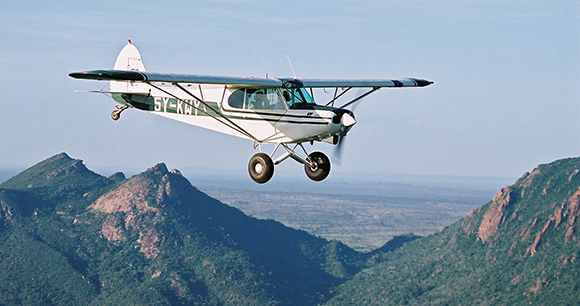
Giving Tuesday, celebrated annually on the Tuesday after Thanksgiving, is a global day of giving fueled by the power of social media. For many, Giving Tuesday (on November 28 this year) marks the start of the charitable holiday season and inspires individuals to give to a worthy cause. For AWI’s 2017 #GivingTuesday campaign, we are asking people to support the protection of African wildlife—in particular, air patrols to stop the poaching of elephants, rhinos, giraffes, buffalos, and other animals.
A key factor in the success of the Kenya Wildlife Service (KWS) in thwarting poachers has been an effective air-ground strategy. By flying light, two-seat patrol planes above Kenya’s 59 national parks and reserves and over the country’s borders, KWS is able to monitor and promptly intercept these killers of wildlife. Conspicuous air patrols have a deterrent effect similar to that of conspicuous state troopers on interstate highways. When KWS planes fly over wildlife habitat, poaching drops to near zero. Earlier this year, AWI acquired and shipped three aircraft engines to the KWS Airwing hangar at Nairobi’s Wilson Airport. The engines were mounted on Husky planes that had worn out their previous engines after thousands of hours on patrol.
As you can imagine, given these planes’ effectiveness against poaching, they have sometimes been shot at and even been hit by ground fire. Fortunately, the danger to KWS pilots can be diminished by providing reliable equipment and regular in-service training in flight safety and proficiency.
This #GivingTuesday, AWI’s #PlaneCampaign, aims to raise $10,000 to provide aircraft parts and equipment to KWS pilots in support of their wildlife protection efforts. Specifically, these funds will help KWS accomplish the following:
- Catch poachers. Even with patrol planes overhead, some poachers persist. Air patrols have been extremely effective in locating these individuals and helping ranger units on the ground intercept and arrest them. An October 2017 CITES report reveals a significant decline in elephant poaching, especially in Kenya—attributable in large part to these patrols.
- Survey wildlife. The planes are instrumental in counting wild animal herds and reporting their location to park management, which can then deploy ranger units more effectively. Aerial surveys can also monitor the animals’ well-being and locate those who may have been caught in illegal traps and snares.
- Prevent human-wildlife conflict. Aerial monitors also protect the park’s human neighbors. Sometimes, elephants stray out of the parks and attempt to dine on community vegetable gardens, upsetting villagers and thereby endangering the elephants. If KWS pilots notice that a particular herd of elephants is wandering too close to a park boundary, they can dispatch a team of rangers to divert the elephants back into the park.
- Deliver supplies. For rangers on patrol, the planes parachute in vital supplies such as ammunition, drinking water, and food (including dog food for tracker dogs).
Any donation,* large or small, to the #PlaneCampaign, will make a difference for elephants, rhinos, giraffes, lions, and other African wildlife. Here are examples of what your donation can provide:
- A $25 donation provides nuts, bolts, and other parts used for regular aircraft maintenance to keep the airplanes safe and reliable. Though they seem like ordinary pieces, the plane and all of its parts are vitally important to the air-ground strategy and efforts to ward off poachers.
- A $50 donation provides an engine oil change, required every 100 hours of flight, which is about one month of patrol flights. Each hour of patrol flight also includes several hours of preparation—aircraft inspection and maintenance, flight planning, coordination with ranger units on the ground, and briefings with park security officers.
- A $100 donation provides enough fuel for a three-hour flight, enabling focused patrols of areas such as the Galana River, the rhinoceros sanctuary, and other key wildlife habitats within Kenya's sprawling Tsavos ecosystem. The three contiguous national parks that make up the Tsavos cover more than 8,000 square miles (larger than New Jersey) and provide habitat for about 16,000 elephants. Because of its richness in elephants, rhinos, and other commercially valuable wild animals, the region is persistently targeted by violent poaching gangs. Effective air patrols are critical to keeping them in check.
- A $500 donation can provide a new set of oversized “tundra tires.” The anti-poaching, animal protective work by the KWS pilots and their planes literally rests on the tires. A blown tire can cause an accident, threatening both pilot and plane. Tundra tires allow the planes to take off and land on rough dirt strips in the African bush. Thus, they can operate out of nearly any open space, providing direct on-the-ground support to rangers—and animals—in the field. Planes with such tires can get in close and quickly pick up a wounded ranger who needs to be evacuated, or ferry a veterinarian to a remote site to free an animal from a snare and tend the wounds.
- A $1,000 donation can provide a VHF radio for a pilot to speak directly to KWS ranger units on the ground. Radio communication is mission critical. A pilot who discovers an elephant carcass can circle and inspect it before reporting the precise GPS location, whether the tusks have been removed, the direction in which the poachers departed, etc. Upon arriving at the carcass, rangers radio observations back to the pilot, such as estimated time since the elephant’s death, size of the poaching gang, and weapons used. Based on this information, the pilot can help the rangers locate and arrest the poachers.
*If you are making a donation via the AWI website for this campaign, please write #GivingTuesday and/or #PlaneCampaign in the “Order Comment” section upon checkout. If donating via PayPal, please write #GivingTuesday and/or #PlaneCampaign in the “Special Instructions” section upon checkout. This will help ensure your donation will specifically support the #PlaneCampaign. All donations made on Giving Tuesday (November 28, 2017) will automatically be designated toward the campaign, unless otherwise noted. Thank you!

If I can’t donate, how else can I support the #PlaneCampaign?
Help spread the word about the campaign to your friends and family! Here are some sample social media posts you can use to promote the campaign:
Twitter:
- This #GivingTuesday, support @AWIOnline’s #PlaneCampaign to help @kwskenya combat #poaching http://bit.ly/2hsGPOG
- Looking for a cause to support on #GivingTuesday? Help @AWIOnline’s #PlaneCampaign for African wildlife take flight! http://bit.ly/2hsGPOG
- Help #AntiPoaching efforts in #Kenya: Consider supporting @AWIOnline this #GivingTuesday http://bit.ly/2hsGPOG #PlaneCampaign
Facebook:
- This year, for its November 28 #GivingTuesday campaign, the @Animal Welfare Institute is supporting the protection of African wildlife—in particular, efforts to stop the poaching of elephants, rhinos, giraffes, buffalos, and other wildlife. Via the #PlaneCampaign, AWI is aiming to raise $10,000 to fund highly effective anti-poaching air patrols by the @Kenya Wildlife Service. Help stamp out poaching by giving to the #PlaneCampaign! http://bit.ly/2hsGPOG